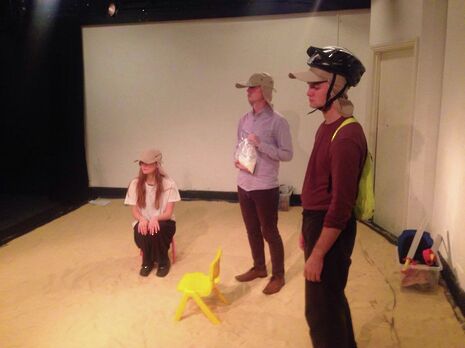Review: Milk Teeth
Julia Salonen was greatly entertained by the absurd humour of Corpus Playhouse’s Milk Teeth

It involves three boxes: one filled with sand, one with toys and the last labeled as “dressing up”. Much like adulthood, the underlined performativity of Milk Teeth, the latest sketch show fostered by Eggbox Comedy, makes a go at the absurd. Growing up complicates things, but it does not have to mean making the word serious the defining superlative of your life.
Building on a loose frame story, the show opens with assistant teachers and students accidentally coming to school on a bank holiday. Delightfully recognisable manoeuvres of children pin these characters to the in-between of expected adultness and actual incomprehension of the workings of that realm – absurdity. The scope of the evening extends from a caricaturistic cooking show (everything is a five-minute meal if you cook it for only five minutes, what a revelation) to a piece that escalates astonishingly quickly to Eve Delaney riding on topless Christian Hines while James Coward shrieks “I love improv!” and John Tothill wonders about Nazi gold. Indeed, the humour of the show successfully derives from the sheer absurdity of things, but a couple of sketches are so incoherent that at times there is a sense that the audience is laughing because they genuinely do not understand what had just happened – quite mirroring the experience of growing up. The comedy is intelligent as well, as can be expected. However, some very short bits are hampered by their length and leave the structure inconsistent.
Although the whole team displays considerable skill and focus, Delaney stands out with her physical acting along Tothill, whose intense seriousness makes the audience roar. Considering the high standard of acting it is then a bit surprising that what is undoubtedly the best sketch of the evening does not include performers on stage. Instead, the audience spends a good five minutes staring at a turnip sitting on a plastic chair. Yes, it is the very winner of BBC’s contest of the best impersonation of a vegetable – and we have his proud mother for an interview on audio.
Proceeding from silly setup to accusations of communism, the sketch rejoices in such verbal expressions as “turniping” and “the state of turniptude”, while the audience gets progressively more self-conscious of the root vegetable – or a boy.
Despite advertising itself as narrative-based, the actual frame story of Milk Teeth remains disappointingly light. In addition to the beginning and the ending, which recalls the former with its inventive scene of second childhood, the show is very loosely held together by the audio between sketches. Confronted by questions such as “what do you think of the two-party system?”, the children who are being interviewed answer with such simple answers that the actual questions seem slightly ridiculous. The adult world is absurd. It is filled with performativity and the pretence of knowing what to do, and Milk Teeth rightfully questions whether it is all worth taking always so seriously. However, this argument could have been much more pronounced. It would have benefited from a stronger frame story, whose absence also leaves the assortment of sketches a bit random. Still, there is definitely potential, as for example the hilarious piece taking the seriousness of Robot Wars to a new dimension (“it wasn't the robot that died tonight”) demonstrates. Exploring the thought further in a stronger frame story would not have diminished the humor of the show, but rather complemented it in addition to leaving a longer lasting impression. Comedy does not have to be dispensable.
All in all, Milk Teeth is a very entertaining production, and the audience sure enjoyed their evening. Now and then it relies a bit heavily on acting rather than on the script, but that hardly matters because the former is so superb. It is bizarre, it is intelligent, it makes you laugh, and maybe, if you listen carefully, it makes you think.
 News / Cambridge and Manchester Universities meet for innovation partnership26 February 2026
News / Cambridge and Manchester Universities meet for innovation partnership26 February 2026 News / Judge Business School advisor resigns over Epstein and Andrew links18 February 2026
News / Judge Business School advisor resigns over Epstein and Andrew links18 February 2026 News / Cambridge academics sign open letter criticising research funding changes22 February 2026
News / Cambridge academics sign open letter criticising research funding changes22 February 2026 News / Private school teacher who lied about Cambridge degree barred from teaching27 February 2026
News / Private school teacher who lied about Cambridge degree barred from teaching27 February 2026 Lifestyle / Finding a home away from home 26 February 2026
Lifestyle / Finding a home away from home 26 February 2026









![How to Create an Attractive Freelancer Portfolio [5 Tips & Examples]](https://www.varsity.co.uk/images/dyn/ecms/320/180/2026/02/vitaly-gariev-ho2tNOWZYXM-unsplash-scaled.jpg)